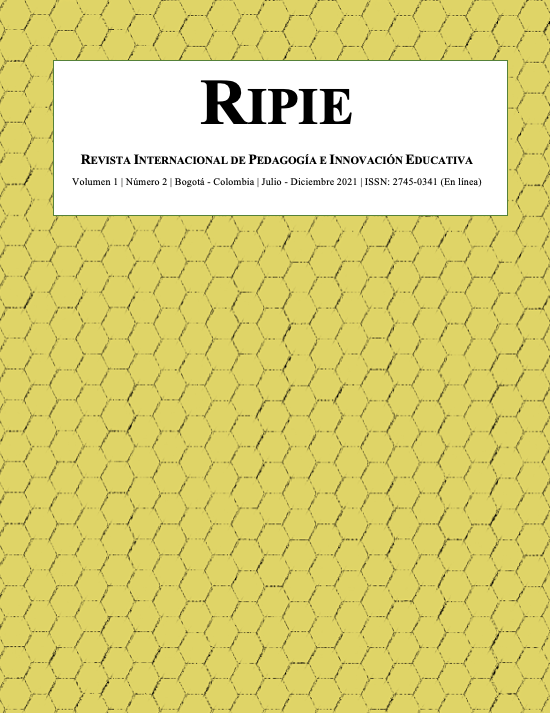Aproximación a las pedagogías emergentes en ambientes virtuales de aprendizaje
DOI:
https://doi.org/10.51660/ripie.v1i2.50Palabras clave:
pedagogías emergentes,, ambiente virtual, aprendizajeResumen
Este resumen recoge algunos de los temas tratados en el curso de actualización de mi práctica docente “Pedagogías emergentes en ambientes virtuales de aprendizaje”, que revisa muchas Metodologías activas para el aprendizaje, Evaluación de estas y algunas sobre Ética, Educación y Tecnología.
En forma especial considera brevemente el uso de las TIC como herramienta cognitiva aplicada a la investigación la que nos exige como docentes un estudio muy acabado de éstas para que los estudiantes puedan disponer de estas amplificadoras de la mente, que estimulen el pensamiento crítico y puedan construir nuevo conocimiento a través de la retroalimentación colaborativa, aún en entornos de incertidumbre muy complejos con una participación social interactiva.
Aprender en tiempos virtuales de aprendizaje es un trabajo extenso pues considera una visión desde Platón, Aristóteles hasta la Inteligencia artificial de nuestros días. El profesor que era el poseedor del conocimiento, hoy en la práctica llega a ser solamente un guía, siempre presente, que observa, propone y estimula al estudiante a través de nuevas y diferentes tecnologías de aprendizaje, así como también aplica nuevas técnicas de la evaluación de este.
Descargas
Referencias
Aparicio Gómez, O. Y. (2019). Uso y apropiación de las TIC en educación. Revista Interamericana de Investigación, Educación y Pedagogía, RIIEP. https://doi.org/10.15332/s1657-107x.2019.0001.04
Aparicio Gómez, O. Y., & Ostos Ortiz, O. L. (2018b). Las TIC como herramientas cognitivas para la investigación. Revista Interamericana de Investigación, Educación y Pedagogía, RIIEP, 11(1), 81–86. https://doi.org/10.15332/s1657-107x.2018.0001.08
Aparicio-Gómez, Oscar-Yecid (2017). Uso de las TIC en el Colegio Padre Manyanet - Chía, Colombia (2011-2014). En Aparicio-Gómez, Oscar-Yecid y Aparicio-Gómez, William-Oswaldo (Eds.). Uso de las TIC para la innovación (pp. 129-158). Bogotá, Colombia: Ed&TIC. ISBN: 978-958-26-0367-0.
Aparicio-Gómez, Oscar-Yecid (2020a). El oficio de sabio: Indagar, investigar, innovar. En: Aparicio-Gómez, Oscar-Yecid y Ostos-Ortiz, Olga-Lucía. (Eds.). Innovación Educativa y Gestión del Conocimiento (pp. 177-192). Bogotá, Colombia: Universidad Santo Tomás. ISBN: 978-958-782-304-2
Aparicio-Gómez, William-Oswaldo y Aparicio-Gómez Oscar-Yecid (2020). Aprendizaje basado en problemas y uso de las TIC. Working Paper No. 200140. DOI: 10.13140/RG.2.2.20238.79681
Aparicio-Gómez, William-Oswaldo y Aparicio-Gómez Oscar-Yecid (2020). Evaluación en entornos digitales. Working Paper No. 200147. DOI: 10.13140/RG.2.2.26399.18080
Artiles, J. A., & Lande, M. (2016). Broadening non-designers’solutions for big issues: The Education Design Shop design thinking workshop. International Journal of Engineering Education, 32(3), 1418–1427. Tempus Publications.
Bennett, J., & Lubben F. (2006). Context‐based chemistry: theSalters approach. International Journal of Science Education, 28(9), 999-1015.
Buchanan, R. (1992). Wicked problems in design thinking. Design Issues, 8(2), 5-21.
Clark, D.B., Tanner-Smith, E.E. & Killingsworth, S. S. (2016). Digital games, design, and learning: a systematic review and meta-analysis. Review of Educational Research, 86(1), 79–122
DeHart, J., Stell, M., & Grant, C. (2020). Social media and the scourge of visual privacy. Information (Switzerland), 11(2). https://doi.org/10.3390/info11020057
Dori, Y. J., Avargil, S., Kohen, Z., & Saar, L. (2018). Context-based learning and metacognitive prompts for enhancing scientific text comprehension. International Journal of Science Education, 40(10), 1198–1220. https://doi.org/10.1080/09500693.2018.1470351
Demartini, C., y Benussi, L. (2017). Do Web 4.0 and Industry 4.0 Imply Education X.0? IT Pro May/June 2017, IEEE Computer Society.
Dinh, T.T.H., Bonner, A., Clark, R. Ramsbotham, J. & Hines, S. (2016). The effectiveness of the teach-back method on adherence and self-management in health education for people with chronic disease: a systematic review. JBI Database of Systematic Reviews and Implementation Reports, 14(1), 210-247.
Finzer, W. (2013). The data science education dilemma. Technology Innovations in Statistics Education,
Georgiadis, K., Van Lankveld, G., Bahreini, K., & Westera, W. (2019). Learning analytics should analyse the learning: Proposing a generic stealth assessment tool. IEEE Conference on Computatonal Intelligence and Games, CIG, 2019-August. https://doi.org/10.1109/CIG.2019.8847960
Gnutova, I. I. (2020). From flipped classroom to flipped learning: Evolution of the concept and its philosophical foundations. Vysshee Obrazovanie v Rossii, 29(3), 86–95. https://doi.org/10.31992/0869-3617-2020-29-3-86-95
Mahmud, S. N. D., Husnin, H., & Soh, T. M. T. (2020). Teaching presence in online gamified education for sustainability learning. Sustainability (Switzerland), 12(9). https://doi.org/10.3390/su12093801
O’Reilly, M. (2015). The influence of emotions, attitudes and perceptions on learning with technology. Research in Learning Technology, Vol. 23. https://doi.org/10.3402/rlt.v23.27763
Quintana J., Aparicio-Gómez, Oscar-Yecid (Eds.) (2017). Temas emergentes en educación. Bogotá, Colombia: Universidad Central. ISBN: 978-958-26-0367-0.
Sánchez-Maroño, N., Alonso-Betanzos, A., Fontenla-Romero, O., Brinquis-Núñez, C., Polhill, J. G., & Craig, T. (2014). Influence of internal values and social networks for achieving sustainable organizations. Frontiers in Artificial Intelligence and Applications, 263, 1179–1184. https://doi.org/10.3233/978-1-61499-419-0-1179
Sharples, M. & Domingue, J. (2016). The Blockchain and Kudos: a distributed system for educational record, reputation and reward. In K. Verbert, M. Sharples & T. Klobučar (Eds.) Adaptive and Adaptable Learning: Proceedings of 11th European Conference on Technology Enhanced Learning (EC-TEL 2015), Lyon, France, 13-16 September 2016. Switzerland: Springer International Publishing, 490-496.
Shute, V. J. (2011). Stealth Assessment in computer-based games to support learning. In S. Tobias and J. D. Fletcher (Eds.) Computer Games and Instruction, Charlotte: Information Age Publishing. 503-524.
Yuan, L. (2019). Discussion on the application of computer big data in internet learning. Proceedings - 2019 12th International Conference on Intelligent Computation Technology and Automation, ICICTA 2019, 482–486. https://doi.org/10.1109/ICICTA49267.2019.00109
Lui, M. y Slotta, JD (2013). Simulaciones inmersivas para aulas inteligentes: exploración de conceptos evolutivos en ciencia secundaria, tecnología, pedagogía y educación, DOI: 10.1080 / 1475939X.2013.838452
Lui, M. y Slotta, JD (2013). Explorando conceptos evolutivos con simulaciones inmersivas. Actas de la X Conferencia Internacional de Ciencias del Aprendizaje (CSCL) - Volumen 1, (págs. 304-311) Sociedad Internacional de Ciencias del Aprendizaje
Descargas
Publicado
Número
Sección
Licencia
Derechos de autor 2021 Revista Internacional de Pedagogía e Innovación Educativa

Esta obra está bajo una licencia internacional Creative Commons Atribución-NoComercial-CompartirIgual 4.0.
Los artículos se publican bajo los términos de una licencia que permite el uso, distribución y reproducción en cualquier medio, siempre que el trabajo original se cite correctamente. Ed&TIC conserva los derechos patrimoniales de las obras publicadas y promueve activamente la reutilización de las mismas bajo los términos de la licencia mencionada anteriormente, lo que fomenta la difusión del conocimiento y la colaboración en la comunidad académica.


